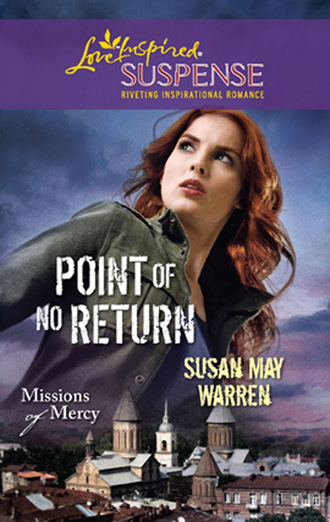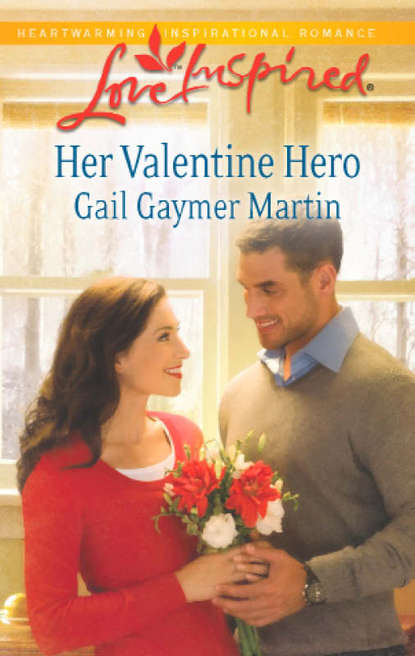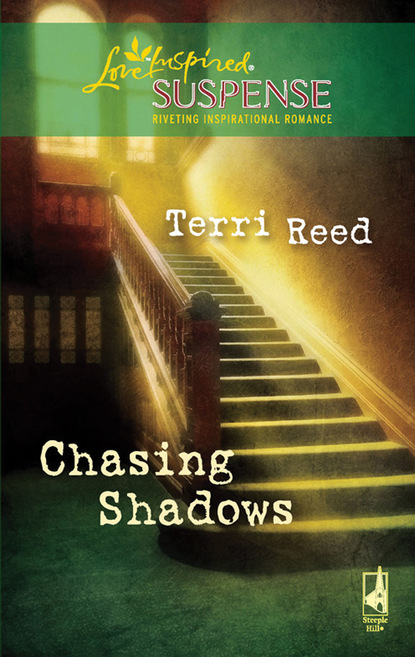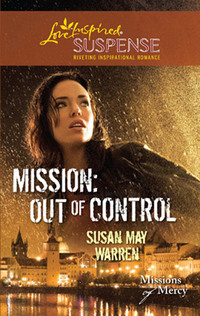
Полная версия
Point Of No Return
“Has it occurred to either of you geniuses that she’s better off? Life at home in Bashim’s camp isn’t exactly peaches. Who knows what she’s had to endure, living on the run in the mountains of northern Georgia with terrorists?”
“She’s a student at Oxford.”
“She looks like a kid.”
“That was taken a few years ago, obviously.” Carlson got up, paced to Chet’s window and peered down at the courtyard. “She was in Western culture long enough to know just what her father is up to, and what it could mean for the world.” He turned to Chet, arms folded.
“She’s betrothed to Akeem Al-Jabar.”
The agent waited as if that name might ring a bell for Chet.
“I’m too tired—”
“Iranian prince. Son of Osama Al-Jabar.”
Oh. Of course. “The same oil tycoon who’s behind the truckloads of cash being poured into Iran’s nuclear program.”
“You do read the international news wires, then.”
“When I’m not catching up on Reader’s Digest. Just so I can connect the dots, Darya is educated, and I’m assuming since you know her political disposition—you, meaning the collective CIA—”
“And others.”
“Right. And others, have coerced—” he particularly enjoyed watching Carlson flinch “—her into a forced marriage so she can, what, spy on the Iranians for you?”
Carlson turned back to the window. Miller pursed his lips, staring at Chet.
“Great. So now I’m a matchmaking service. Let me get my wand.” He pushed back from the chair and stood. “I don’t know what you’re thinking, guys, but I’m not going to track down a runaway girl and drag her back by her hair like some caveman so I can throw her into marital slavery. Sorry, but I gotta draw the line somewhere.”
“I know you won’t draw the line at dressing like Snow White, but saving the world from nuclear holocaust puts you over the edge?”
Chet scooped up the folder and held it out. “Personally, I’m against human trafficking in all forms. You should have discovered that in your homework somewhere.” Before he started his company, he’d spent five years—and earned one spider-webbed scar low in his gut—bringing down a Chinese human trafficking ring. His last great mission.
He stared at Carlson, then Miller. “I can’t help you boys.”
Miller stood and took the folder. “That’s a real shame, because I hear that Bashim already has a price out for the kid who took her.” He met Chet’s eyes, speaking slowly. “And anyone caught aiding and abetting him.”
So they had been tapping his phone.
“Listen, Stryker,” Carlson said quietly. “Darya agreed to the marriage. In fact, she came to us with the idea of marrying Al-Jabar. They’re friends from London. We’re not the thugs you’ve drawn in your mind.”
“She ran away for a reason.”
“She’s nineteen. She got cold feet. Or maybe she has a thing for this kid. We don’t exactly know, but until someone finds them, Bashim is a powder keg. He gets itchy and invades Georgia again, and suddenly we have an international incident. Georgia fights back, Russia roars in to protect Ossetia, and with Georgia on track to be a member of NATO, well, who knows how far this thing could reach,” said Miller.
Translation: American troops on the front lines of another war.
“And, as Miller pointed out, this thing touches home for you in many ways, doesn’t it?”
Chet wasn’t sure what they might be referring to. Yes, he’d spent his years early in his career arming the Ossetian rebels, namely Akif Bashim and his tribesmen, for freedom during their civil war. Back in the late eighties, the powers that be had simply wanted Ossetia to break free of Russia’s grip, via the Republic of Georgia. But he held no allegiances to Ossetia—especially since, twenty years later, they had banded with the Russians to attack Georgia. Maybe Miller referred to Chet’s hope of revenge and the opportunity to see Bashim pay for murdering the woman Chet was tasked to protect. Or perhaps he referred to rescuing Mae Lund, the woman he couldn’t forget—didn’t want to forget—who was now flying right into the danger zone of southern Georgia without a clue about the hornet’s nest awaiting her.
He sighed.
Miller tossed the file back on the desk. “There’s a visa and your flight pass. Hope you don’t mind flying military. It’ll be just like old times.”
Oh, joy, the chilly back end of a C-130. He hoped he still had his earplugs.
Carlson followed Miller out. “According to our sources, you’ve got five days until the groom arrives. Try not to be late for the wedding.”
It didn’t matter what former Soviet satellite country Mae stepped into—it all smelled, sounded and felt like Moscow.
It wasn’t a fair assessment, and Mae knew it—after all, Ukraine had worked hard to shed the residue of Russian imperialism the minute the iron curtain fell. Mae well remembered the crowds toppling the iron statues of Lenin along Khreschatyk Street. And Latvia and Estonia fought for their freedom years before they actually saw the Russian tanks heading for the border.
But despite the battles for freedom, Russia had stamped her architectural and cultural fingerprint onto the satellite societies so indelibly that, as Mae climbed up from the subway line to the center of Tbilisi, Georgia, time swept her back to her days at Moscow University.
From the names of the streets—Lenin Square, of course, and Komsolmolskaya Street—to the statuesque cement buildings with their narrow wrought-iron balconies and street vendors lined up selling shiny gold religious icons, sunflower seeds, walnuts and bright pink peonies…she could be standing in the shadow of the Kremlin. She half expected to see her old college Russian pals, Roman and Vicktor, emerge from under the red umbrella of a food vendor, holding a dripping plumbere ice-cream cone.
In a wide fountain at the end of the square, children splashed, water dribbling off the backs of their drawers as they shivered in the early fall air. A yellow trolley-bus rattled by, sparks jumping off the overhead electric line. Mae’s stomach rolled over at the aroma of grilled mutton—shashlik, probably—but all she spotted was a scarf-headed babushka in a doughy apron sitting beside a tin milk can hawking chebureki—deep-fried meat sandwiches. She’d exchanged money at the airport and now held out a bill, waving off the change as the woman handed her the bread wrapped in grease-dotted paper.
She bit into it, letting the grease drip out onto the sidewalk, and familiarity soothed her ragged nerves as she focused on her next steps.
She hadn’t eaten since the airport in New York, about a thousand years ago.
A thousand years, four airplanes, and three hours in passport control. Thankfully, she still had some connections, the kind that could nab her a humanitarian-aid visa in twenty-four hours, which she picked up in Amsterdam. She owed pal and embassy officer in Russia David Curtiss again, for his quiet trust in her, as well as his string-pulling.
She refused to even allow Chet’s reaction to her trip into the no-fly zone to enter her thoughts. Have you learned nothing about acting on impulse?
Hey, impulse saved lives. Sometimes impulse was all a girl had.
Although impulse was exactly how she’d ended up getting her heart broken with Chet. Maybe he had a point.
She used to be some sort of army pilot—they said she could fly just about anything. Too bad she threw away her career. Now she’s waiting tables…
She heard the voice in her head and tried to shake it away, remembering now how she’d stood at the threshold of the sliding-glass door to the balcony of Gracie’s apartment two years ago listening to three know-it-all teenagers from the youth group Gracie worked with summing up her life. Or rather, the life of the “hot redhead who lives with Gracie.” She’d nearly crammed the serving plate full of cream-cheese roll-ups she’d been about to bring them down their throats.
She appreciated the fact those words hadn’t issued from the military type who’d come to Gracie’s birthday party dressed in a pair of jeans and a suit coat, the one who stood for ten minutes by the door, sizing up the room as if searching for terrorists, before wandering out to the balcony.
Mae still hadn’t gotten his name and hated that her gaze had lingered on him, taking in his dark blue eyes, curly, short dark hair and wide shoulders. He stuck one hand into his front jeans pocket—a casual pose—but every inch of him radiated a sort of coiled tension, as if at the slightest provocation, he might morph into Jason Bourne or Jack Bauer.
He stood apart from the teens, clearly listening and forming his own opinion as one of those dark eyebrows arched up.
Mae shouldered right into the group, ignored the openmouthed expressions of her accusers, and shoved the plate at the chief hanging judge, a pimply kid no more than seventeen with wide eyes peeking through a shank of unwashed hair. “Care for a cream-cheese roll-up? Gotta earn my tips, after all.”
He blanched, and with a shaky hand reached for the appetizer.
“Be glad you don’t pull back a nub, son,” the quiet man said from just behind him. Mae narrowed her eyes at his slight smirk, then turned on her heel, ready to bail.
So it was her new roommate’s birthday party. So what if one of Gracie’s best friends from Russia had shown up. Last time Mae had checked her status, she was jobless, her former squeeze—Vicktor—was engaged to said roommate, and now she had a bunch of teenagers laughing at her and her dismal life. And to make it worse, as she returned to Gracie’s squatty galley kitchen, yet another teenager from Gracie’s youth group streaked out and hit the plate, which flew from Mae’s grip.
“Clearly, you’re not a waitress.” She whirled and Special Ops from the balcony held up his hands in surrender. “Not a criticism. Just an observation.” He bent down and began to gather up the debris.
“No, I’m not,” she finally said, as he stood and handed her the plate. “I’m a pilot.”
“And according to my former partner David, a good one.”
And then he smiled.
Beautiful. Lethal. She actually felt her heart stop.
“Chet Stryker. Gracie’s cousin.”
And the Delta Force pal of one of her best friends, David Curtiss.
Oh, she knew how to pick ’em.
She smiled and stuck out her hand. “Mae Lund. Former pilot and current catastrophe.”
She meant it as a joke, but even as the words came out, they felt so raw, so fresh, that stupid tears raked her eyes.
She turned away before he could see.
But he had, because he touched her arm. “Don’t listen to those kids. They don’t know the facts like I do. You saved a friend from execution, even if you had to break a couple international laws to do it—that’s worth waiting tables, I think.”
She closed her eyes. Yes. Yes, it was.
He turned her, gently. “Hey, we all make choices we regret. Even if they’re the right ones.” He pushed her long red hair from her eyes, tucking it around her ear. “C’mon. Let’s get out of here. I promise to take good care of you.”
Such good care that a year later, knowing what it meant to her, he refused to give Mae a job flying for Stryker International.
Sometimes she just wished for a man who wasn’t quite so…protective.
Except it wasn’t as if Chet had come rushing to Tbilsi, was it? Apparently Chet had really meant it when he said he didn’t want her on his team. He didn’t even want to be associated with her.
It didn’t matter. She was so over Chet Stryker. Over him and his swagger and his overprotective urges and his devastating smile. O-ver.
She’d find Joshy on her own.
She wadded the greasy paper and sandwich into a ball and threw it into a trash can, no longer hungry.
Now that she was here, she’d start by checking in with the powers that be—namely, the American Embassy—and see if they might point her in the right direction.
She’d looked up the address online at a kiosk in Amsterdam and printed a map, and now headed in what she hoped was the right direction.
Funny, she’d expected less foot traffic, given that the residents of Georgia had been through a war not so long ago. Instead, street cafés and vendors selling ice cream and hot dogs festooned the sidewalks. Strollers scattered pigeons, and the occasional artist called out a price.
Normalcy. A country in crisis craved it, perhaps.
She understood. Whenever she’d come home from a mission, especially a rescue, she’d dive into her routine—yoga, health food, Bible study on base and weekly phone calls home.
She hadn’t had a real routine since she’d left the military. Which was why, perhaps, she was always living in crisis mode, pushing herself, never finding her default rhythm.
In a way, the foreign aromas made her feel more at home than anything had in the two years she’d spent in Seattle.
She turned onto George Balanchine Street and spotted the embassy set off from the road, wire fencing cordoning off Little America from the rest of the world. A guard station flanked a gate at the end of the rectangular fencing. A driveway beyond led to an enormous white building—austere in relation to the rich architecture of the Tbilisi streetscape. Of course, Americans had to be different, stand apart, resist blending in.
She hoped, however, just this once, her nephew hadn’t listened to her advice and had done exactly that—not blended in. It would be a thousand times easier to find him if he’d left a conspicuous trail.
And as for this runaway girl…well, Mae hoped she was worth it.
The light changed and she stepped out to cross.
Something grabbed at the canvas bag slung across her body, jerking her back.
On instinct, she whirled around to slam her fist on the hand holding her bag. Didn’t even think when she followed with a side kick to the shins.
She finished with a stiff arm chop to the neck.
The pickpocket didn’t run. Didn’t, in fact, even flinch. He just blocked her chop, his grip iron on her bag, dark eyes on hers, his voice just above a growl. “Calm down and stop hitting me.”
Then he released her bag. Mae tripped back, words stuck in her throat.
Chet?
He looked good, too. Dark curly hair, a little shorter than she remembered. Rumpled in a gray snap-button denim shirt rolled up just above the elbows. And a messenger bag slung across his chest. He stared at her with those piercing blue eyes that seemed to be able, in this moment, to stun her into silence. Chet Stryker. The man who’d told her that she couldn’t ever be on his team. That she couldn’t keep up.
That he didn’t want her in his life.
He had her off balance—that was why she let him drag her back toward the shadowy enclave between two doors. She was still reeling when he pushed her against the wall, bracketed her between his arms, and said tightly, “Can’t you listen to anything I say?”
And then, because it felt right, because he deserved it, because all her adrenaline suddenly peaked, she hit him again.
Square in the chest. “Apparently not.”
Конец ознакомительного фрагмента.
Текст предоставлен ООО «ЛитРес».
Прочитайте эту книгу целиком, купив полную легальную версию на ЛитРес.
Безопасно оплатить книгу можно банковской картой Visa, MasterCard, Maestro, со счета мобильного телефона, с платежного терминала, в салоне МТС или Связной, через PayPal, WebMoney, Яндекс.Деньги, QIWI Кошелек, бонусными картами или другим удобным Вам способом.






